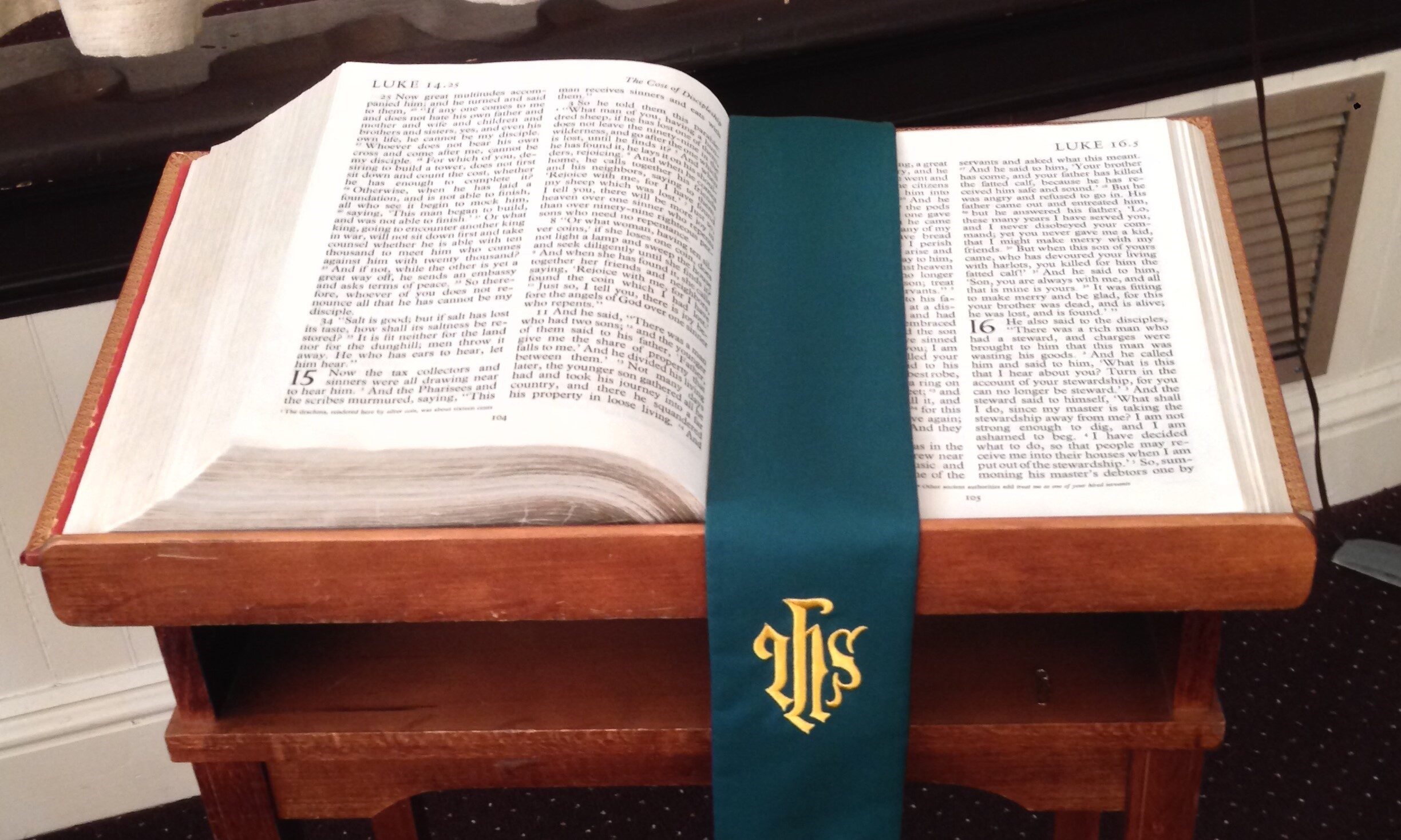Sermon Sunday February 23, 2025
Rev. Norman A. Michaud
“Blessedness 2.0”
Luke 6: 17-38
This Sunday, after his personal prayer on a mountain, Jesus gathered his disciples, named them, and brought them to a place on even ground, a plain. On level ground, he could speak directly to the multitudes who encircled him. Many came to be healed of physical ailments. Many came with spiritual yearning. The people looked for answers. Luke’s Jesus offers blessings and warnings in his Sermon. Jesus reminds the newly healed crowd that grace is free and abundant, but “THE WAY” requires sacrifice. It’s as simple and as hard to hear as that. Perhaps our theme this week might be “Being Blessed (Or Not).” Or possibly, “Being Blessed: Now What?”
Pain and anxiety bring us closer to God. Personal materialistic comfort brings us burdens, often in the form of debts. Are woes the seeds of neurosis? I sometimes wake up at night thinking of what I must do the next day, week, and month. However, I plow forward, but am I the horse or the plow? I fear I am the horse. If I give up my efforts to the Holy Spirit, I become a happy horse. The Holy Spirit will drive the plowshare and use my energy to till the soil. The Spirit allows the teachings of Jesus to remain, and my work becomes worthy. I accept the burdens and return to the active blessings offered by The Sermon on the Plain.
The Sermon on the Plain reminds me of an event I shared with Sarah. We attended a concert given by Nobel Prize-winning poet/singer Bob Dylan at Red Rocks in Colorado. We hoped to hear “Blowing in the Wind” among many of his most-known songs. Late in the concert, Dylan began to sing “Blowing in the Wind,” but as we listened, the meaning seemed the same, but he changed the lyrics. The audience grumbled. Dylan himself had changed the iconic and orthodox anthem.
Dylan’s revision reminded me of when Dylan went from acoustic to electric in Newport, RI, in 1965. The revision moved us because we allowed it to change, and the times have changed. Dylan informed us that meaning perseveres but reflects new circumstances and present woes. His transition is reflected in Matthew’s Sermon on the Mount and Luke’s Sermon on the Plain.
Do we then request a refund because we did not hear what we expected? Or do we listen and become reminded of the fresh impact on us in the here and now? I do not read and listen to Luke’s Sermon on the Plain as a second-rate Beatitudes presented in Matthew 5. The audience is new, the time is different. I recall something I read from Kurt Vonnegut Jr. years ago.
Kurt Vonnegut Jr. wrote, “For some reason, the most vocal Christians among us never mention the Beatitudes (Matthew 5 and Luke 6). But, often with tears in their eyes, some demand that the Ten Commandments be posted in public buildings. And, of course, that’s Moses, not Jesus. I haven’t heard one of them demand that the Sermon on the Mount, the Beatitudes, be posted anywhere. “Blessed are the merciful” in a courtroom? “Blessed are the peacemakers” in the Pentagon?”
The Gospel text says that Jesus healed not just a few but all those who came to him that day, hungering in many ways for dignity and acceptance, wholeness and health, forgiveness, freedom, and hope.
In Luke’s account, Jesus speaks eye to eye with the gathered people rather than from above them is significant. Jesus speaks to the people who have little or nothing to offer. Miracles abound. Those present will tell others that something new and powerful is happening in the presence of this man, Jesus. They will tell others what they witnessed. Their witness will expand his teachings, and in that expansion, suspicion will increase among the Hebrew authorities and the Roman Empire.
In Luke, Jesus addresses the crowd, using the second person rather than the third – “Blessed are you,” not “those who” – because Jesus speaks directly to the people.
Luke’s version of the Beatitudes is much shorter than Matthew’s. It takes Matthew 2679 words lines to recount what Jesus said. Luke, in a near 515 words covers the same blessings and emphasizes their meaning, stating Woes or Warnings that prevent us from God’s Blessings. Though all may face stormy seas and winds on their journeys, Jesus offers all a safe harbor if we fulfill his words through our actions. He speaks to the people’s hearts, hopes, and healing. Those who fail to heed his call will find danger.
The texts for Epiphany – discipleship, the teaching, and the crowds who hunger for good news- show Jesus discerning his meaning, or transformation, in becoming Christ. We are shown who Jesus is, God’s own Beloved, Immanuel, and hear the Good News he brings, but we are also called to respond and to follow in the way of blessing, not woe—how we respond, how we live, what we do, matters.
Some people react angrily when preachers “meddle with politics.” But New Testament preachers, following Christ, must call for mercy for those who suffer. The majority of Christians feel uncomfortable with the world’s suffering and want to hear words of hope while calling people to be reminded of Jesus’ call for us.
While God blesses us all and God’s grace is poured upon us all, rich and poor alike, we might pray for the grace to participate in the “reign of generosity” proclaimed throughout the Bible. We might understand the difference between God’s abundance and our excess.
This approach does not harmonize with the currently popular “prosperity theology,” which has enabled many Christians to live quite comfortably with their wealth and see it as a sign of God’s special approval of how they conduct themselves. Followers of Christ should be strengthened in their resolve when we remember another lesson often repeated in the Bible, including Luke’s Gospel: “Do not be afraid.” And those words are words for us all.
Power, advantage, and privilege come in many forms, and we often hear those words used in discussing our political differences. We should also focus on vulnerability, powerlessness, and need, not as a matter of pity but as a way to adjust our vision and correct our lenses. God’s calls for compassion for those in dire need, those most vulnerable, and those who seek justice.
I have my NPR moments which are called, “Drive Way Moments.” Once in a blue moon I sit in my car listening to some interview before I turn off the car. An NPR show, “Here and Now” was interviewing an award winning poet, Sarah Kay, who is also the poetry editor for the Paris Review. She wrote this poem as COVID-19 swept across the world.
The author stated, “The world feels upside down, and still, there’s a quiet hum getting louder every day. Something like a small chorus inside of darkness vibrating towards hope. There’s a horizon for every soul I’m carrying. I nearly always frame such poems with a second layer, informed by Christ, God, and agape, for God is always with us and God is Love, the love we all yearn for.”
When I sat in my car I believed I heard the “second-layer.” Perhaps you will too.
Here is Kay’s Poem, ”Here and Now.”
Here and now, I have only these hands,
This mouth, this skin as wide as the shoreline,
This beehive between my ears, this buzz, this buzz.
You are the best thing I never planned.
This is the widest I can stretch my arms without dropping things.
This is the first time I don’t care if I drop things.
This is what dropping things feels like.
This is what happens when the flowers wake up on a morning
And decide to smell human: it confuses us,
Makes us reach backwards into places that are sharp,
Feel around for things we’ve dropped.
I have forgotten what I was looking for.
It doesn’t seem important.
You brought me flowers.
You made the bed.
This is the widest I can stretch my arms.
This is all I have right now.


